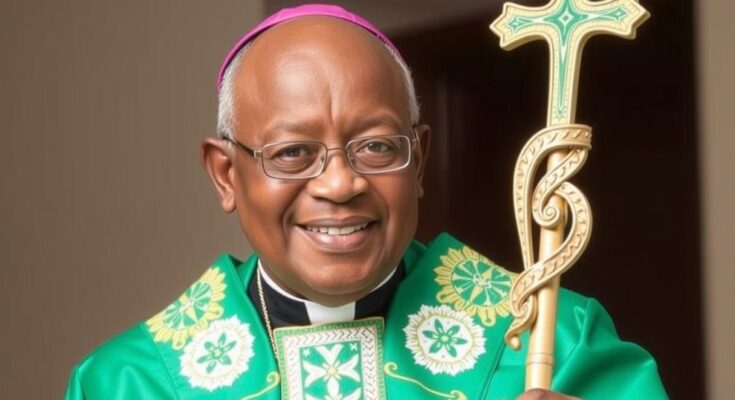Archbishop Samuel Kleda of Douala has urged Cameroon’s ageing leaders, particularly President Paul Biya, to resign in favor of a new generation of leaders. He criticized the negative impact of poor governance, corruption, and the disconnection between the nation’s wealth and its widespread poverty. Kleda emphasized the need for effective leadership to facilitate youth job creation and infrastructure development while encouraging citizens to participate in elections as a means of instigating change.
In a compelling address, Archbishop Samuel Kleda of Douala has called upon the elderly leaders of Cameroon to step aside and allow a new generation to take the helm of governance. Speaking to local news channel RTVC, the Archbishop criticized the rampant issues of corruption, bad governance, and the stark contrast between the nation’s abundant resources and the pervasive poverty affecting its people. He remarked, “When we get to a certain age, we no longer have certain abilities, whether it is intellectual or physical.” This statement encapsulates his concern over the effects of aging on leadership effectiveness, particularly in the case of President Paul Biya, who has held power for 42 years and is nearing the age of 92.
Archbishop Kleda’s remarks signify a growing sentiment within Cameroon regarding the capacity of aging leaders to govern effectively. While he refrained from naming specific individuals, it is evident that his observations were directed towards President Biya. His health concerns were highlighted during the 2019 Paris Peace Forum, where he struggled with questions regarding his cognitive abilities, raising alarms about his capacity to lead. Furthermore, Archbishop Kleda emphasized the necessity for leaders to relinquish their positions once they are no longer able to fulfill their duties.
“The incapacity to effectively govern means that development has been stalled,” he stated, pointing out that the lack of an enabling environment for youth employment has led to an exodus of young people seeking opportunities abroad. He expressed dismay over the rich mineral and agricultural potential of Cameroon, stating, “What do we lack in Cameroon? We have everything,” alluding to the significant mismanagement of natural resources.
Furthermore, Archbishop Kleda lamented the deteriorating state of infrastructure, particularly the poor condition of roads that hinder economic activity and accessibility. He articulated the dire situation by stating, “Today in Cameroon, if you want to move, you must first think carefully how you are going to move,” portraying the extensive hardships faced by citizens due to unmet infrastructure needs.
Addressing the economic disparities, the Archbishop pointed out that the rich continue to prosper while the poor sink into deeper misery, remarking, “We have reached the level where the country has been divided into two classes.” As Cameroonians prepare to go to the polls next year amidst these pressing issues, he urged citizens to exercise their electoral rights, reinforcing the belief that “each vote could just be the source of change.”
Archbishop Samuel Kleda of Douala has emerged as a significant voice in advocating for political change in Cameroon, especially concerning the aging leadership of President Paul Biya, who has ruled since 1982. The Archbishop’s commentary on the interplay of age and governance reflects a broader concern regarding the effectiveness of leaders who may no longer possess the required capabilities to meet the demands of modern governance. Underlying these calls for new leadership is the urgent need for development in Cameroon, which is rich in natural resources yet plagued by poverty and deteriorating infrastructure.
Archbishop Kleda’s appeal for the resignation of aging leaders underscores a critical tension in Cameroon between leadership longevity and effective governance. His poignant observations about governance failures, the needs of the youth, and economic disparities resonate with many Cameroonians who are eager for substantive change and improvement in their living conditions. As the 2024 presidential election approaches, the Archbishop’s message for civic engagement and voting stands as a beacon of hope for potential transformation in a country rich in resources yet struggling with profound inequalities.
Original Source: cruxnow.com




